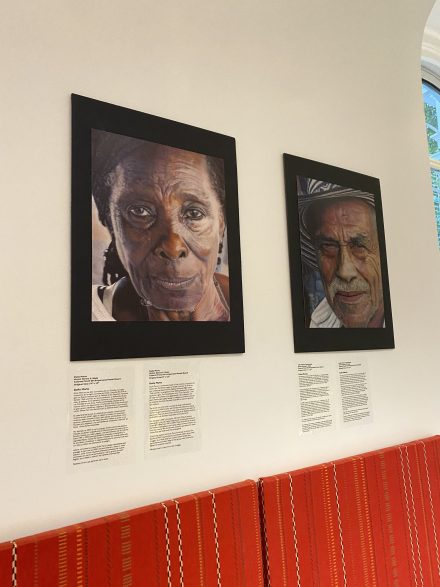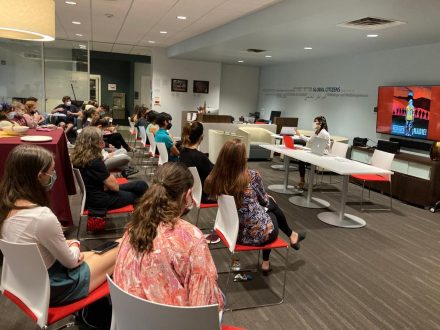The final conference, “The Persistence of the Nightmare: Argentine Narrative of the 21st Century," was hosted by Distinguished Professor at North Carolina State University Greg Dawes at Carlton Commons on Nov. 9.
The Department of World Languages and Cultures hosted a series of in-person and online conferences on ecological and political and justice in Latin America during the 2021 fall semester.
The events, which ended on Nov. 9, explored contemporary environmental issues and the representation of the politics of expropriation. They fostered a space for the Elon community to explore eco-political and historical justice from a multidisciplinary perspective focusing on the cases of Guatemala, Colombia and Argentina. The conferences strengthened critical reflection and intercultural competence by approaching the question of political justice and ecological problems concerning historical contexts in the region and Latin American communities nowadays. The events were complemented by an art exhibition still open at the Carlton Commons.

The first conference took place on Oct. 5 and was given by the Fulbright Visiting Scholar from Universidad del Valle and Clemson University, Irene Vélez-Torres. It was titled “Context and transdisciplinary collaborations to build meaningful knowledge on Mercury pollution in AGM, Colombia.”
The talk shared the outcomes of a five-year project, in which a team of researchers has joined efforts with Afro-Colombian miners from north Cauca to assess mercury contamination and generate knowledge that can be appropriated by inhabitants and traditional mining communities. The event offered a unique opportunity to Elon students to approach current environmental issues in Latin America and fostered their motivation to further explore projects based on the link between the academy and community work.
Irene Velez’s talk was complemented by the opening of the art exhibition “The Faces of Colombia: The Invisible Communities” by the North Carolina artist Donna Slade at the Carlton Commons. The opening fostered an exceptional occasion for Elon students and enriched the academic learning space by critically reflecting on the artistic representation of identities and cultural issues. The art exhibition, currently displayed, shows the faces of displaced people and victims of the long-historical conflict that has affected Colombia for more than five decades. It exposes portraits of women and children who are still seeking better conditions and facing the violence of paramilitary and other armed groups.
The second conference took place on Oct. 20. In the event, the Casa de las Americas’ award-winning and Associate Professor at the University of North Carolina-Chapel Hill, Emil’ Keme, presented “Humberto Ak’abal’s The Animal Gathering: The Maya Environmental Imagination.”
The conference was held on Zoom and created a virtual space to discuss indigenous poetry. Keme argued that the invocation of animals by the poet Ak’abal develops a critique of Western modernity and, more specifically, of the indigenous genocide in Guatemala. The conference explored how Ak’abal’s work suggests critically analyzing a profound crisis in humanity that has come to undermine a loss in our original relationship with animals, mother nature and the planet as a whole; such crisis manifests itself today with climate change.
The conference allowed the Elon community to strengthen its abilities to understand the indigenous cultures of Central America by reassessing the positive impacts of studying their native poetry and reflecting on the racial consequences of environmental exploitation.

Finally, the series of conferences ended on Nov. 9 with a talk by Distinguished Professor at North Carolina State University Greg Dawes at Carlton Commons. Dawes presented “The Persistence of the Nightmare: Argentine Narrative of the 21st Century.”
The conference approached, through literary representation, the authoritarian regime of Argentina during the years known as the “Dirty War” (1976-1983). Dawes critically reflected on the conditions of political justice concerning literary productions that played a crucial role in representing the contexts of extreme repression by an authoritarian military government. The talk approached the work of Leopoldo Brizuela and other renowned Argentinean writers, highlighting the relevance of maintaining a historical memory of human rights violations.
The events strengthened relationship between departments, programs, and interdisciplinary minors across Elon campus. They were hosted by the Department of World Languages and Cultures and sponsored by Elon College, the College of Arts and Sciences; the Center for the Advancement of Teaching and Learning; the Isabella Cannon Global Education Center; El Centro; the Latin American Studies Interdisciplinary Minor Program; Peace and Conflict Studies Program; Women’s, Gender, and Sexualities Studies Program; International and Global Studies; the Department of Sociology and Anthropology; Geography and Human Service Studies Department.


